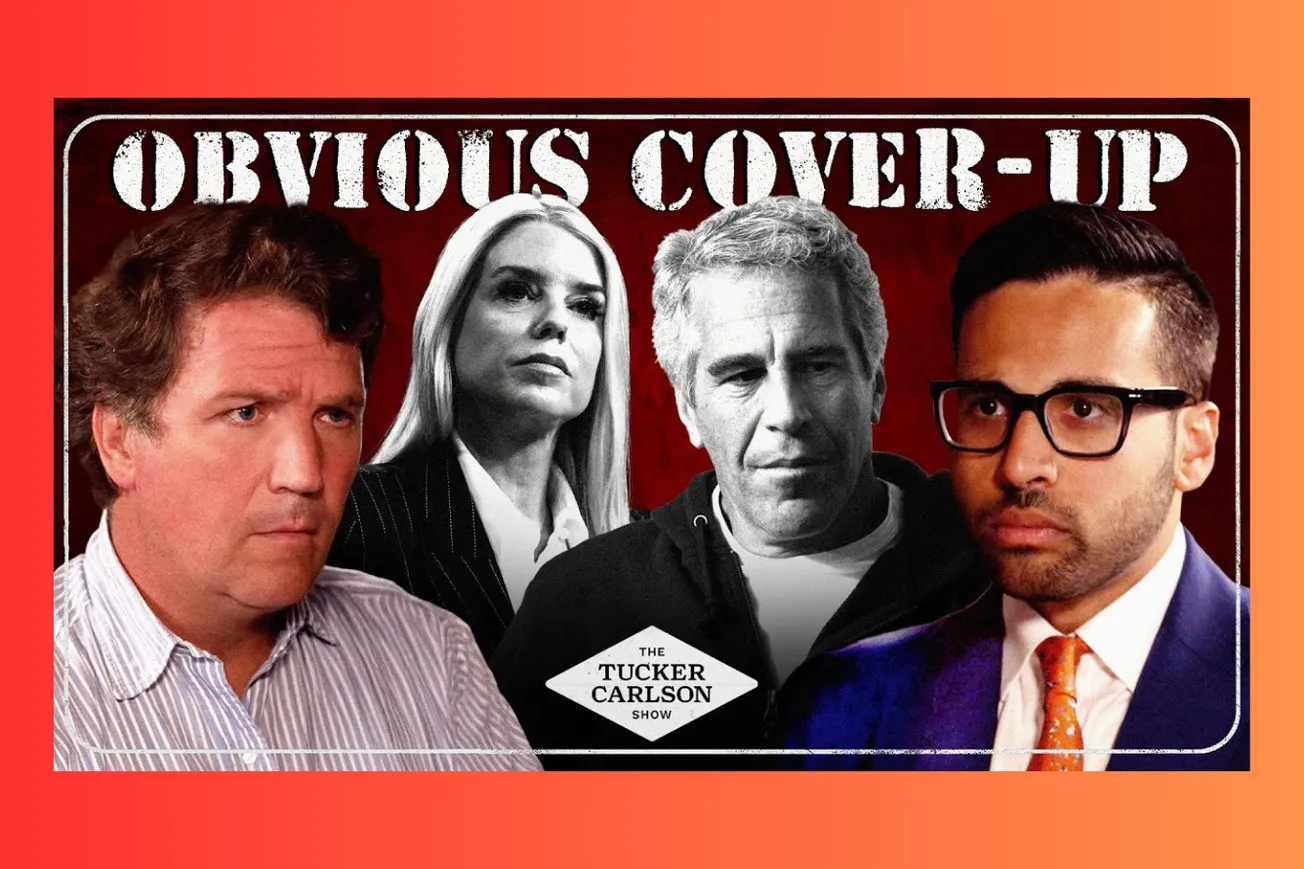Table of Contents
Tucker Carlson and Saagar Enjeti expose how Attorney General Pam Bondi's recent statements contradict her earlier promises about Epstein transparency, revealing systematic government protection of elite networks.
Tucker Carlson and Saagar Enjeti dissect the Trump administration's shocking reversal on Jeffrey Epstein transparency, exposing deep corruption within America's justice system.
Key Takeaways
- Attorney General Pam Bondi contradicted her own previous statements, claiming no client list exists after promising full transparency
- DOJ officials including Cash Patel have systematically covered up evidence of intelligence operations involving US and Israeli services
- The document release timing coincided suspiciously with Israeli Prime Minister Netanyahu's third Washington visit this year
- Released camera footage deliberately ends before showing Epstein's body removal, undermining suicide narrative
- Financial evidence shows Epstein operated as money laundering conduit for intelligence services through figures like Leslie Wexner
- Government protection signals to elite networks that the system will shield them regardless of public outrage
- Young voters who supported Trump feel betrayed by officials who campaigned on transparency but reversed course upon taking office
Systematic Government Deception
The conversation opens with Tucker's sardonic "apology" to Jeffrey Epstein, highlighting the absurdity of Pam Bondi's recent characterization. After promising transparency and claiming possession of client lists, Bondi reversed course entirely. She now maintains Epstein killed himself after 36 days in prison "for no reason" and dismisses the case as involving merely "naughty massages."
Saagar emphasizes how officials like Cash Patel and Dan Bongino built careers promising MAGA supporters they would expose the truth. Instead, they've engaged in what he calls "lying before Congress" and promoting obvious suicide narratives. Patel's appearance on Joe Rogan, asking for trust while withholding information, particularly galled both hosts.
The timing proves especially suspicious. The administration released these documents immediately before Netanyahu's third Washington visit this year—an unusual frequency that both hosts note exceeds visits from leaders of countries with far larger trade relationships with America.
Intelligence Operations and Money Laundering
The discussion reveals Epstein's role extended far beyond sex trafficking into sophisticated intelligence operations. Saagar outlines how Epstein functioned as a high-stakes money laundering expert, beginning at Bear Stearns and connecting with figures like Leon Black, who paid him $170 million through shell corporations for allegedly worthless tax advice.
Leslie Wexner's relationship proves particularly telling. In 1991, Wexner signed full power of attorney to Epstein, making him head of the Wexner Foundation. Through this position, Epstein funneled $2.5 million to Ehud Barak, former Israeli Prime Minister. The money laundering capabilities enabled arms deals and off-the-books intelligence operations stretching back decades.
Robert Maxwell's background provides crucial context. Gileain Maxwell's father operated as what Daryl Cooper described as "a sovereign wealth fund" brokering deals between Israel and Iran. Epstein met Pentagon officials at age 28 through connections to these established intelligence networks.
The Murder Cover-Up
Tucker shares his personal investigation into Epstein's death, sparked by conversations with Epstein's brother Mark. Despite initial skepticism about murder theories, Tucker became convinced Epstein was killed in his cell. The most secure federal lockup in America cannot experience such "accidents" without state actor involvement.
The released footage deliberately ends before showing body removal. More damning, authorities refuse to identify other inmates on that cell block, claiming privacy protections for people who "can't vote or own firearms." Multiple inmates were transferred immediately after Epstein's death, with their current whereabouts unknown.
Michael Baden, America's most prominent forensic pathologist, concluded the death was not suicide after reviewing all evidence. The cover-up serves as a signal to other compromised elites that the government will protect them regardless of public scrutiny.
Foreign Influence and Elite Protection
The conversation explores how intelligence services—both US and Israeli—remain at the center of the cover-up. Alex Acosta, who gave Epstein his original sweetheart deal, testified under oath that he was told Epstein "belonged to intelligence." This explains the systematic protection spanning multiple administrations.
Saagar argues the lies aren't meant to convince the public but to signal protective intentions to implicated parties. The timing around Netanyahu's visit reinforces this interpretation. The cover-up demonstrates how foreign intelligence operations have captured significant portions of the American government.
Financial institutions like Deutsche Bank ignored their own procedures for Epstein, accepting explanations that thousands of $9,900 cash withdrawals were "tips." Such systematic rule-breaking at major banks suggests institutional capture extending throughout the financial system.
Broader Implications for American Sovereignty
Both hosts connect the Epstein cover-up to broader patterns of foreign influence in American politics. They discuss how billions flow to Israel annually while domestic problems remain unaddressed. The Jonathan Pollard case exemplifies the problem—Israel took classified US intelligence and gave it to the Soviet Union, yet Netanyahu lobbied American presidents for Pollard's release.
The conversation reveals how pro-Israel influence has captured portions of the American right, turning MAGA's "America First" message into another vehicle for foreign interests. Students can now face deportation for protesting Israel while burning American flags carries lesser penalties.
This foreign capture extends beyond Israel to include Ukraine funding and NATO expansion, all conducted while ordinary Americans struggle with housing costs, gambling addiction through apps like DraftKings, and economic precarity.
Media and Independent Journalism
Saagar shares his journey from White House correspondent to independent media, illustrating how mainstream outlets function as "trade publications for Washington." The White House press corps operates as a cartel focused on access rather than truth-telling. Reporters compete for proximity to power rather than serving public interests.
Going independent required abandoning the social capital of Washington dinner parties and cocktail circuits. However, the alternative media ecosystem—including figures like Joe Rogan, Dave Smith, and Tim Dillon—offers authentic relationships based on truth-telling rather than institutional loyalty.
The conversation demonstrates how independent media threatens established power structures by enabling discussions impossible within corporate constraints. Topics like Epstein, foreign influence, and elite corruption become speakable when journalists escape institutional control.
Economic Extraction and Political Solutions
The hosts discuss how modern American capitalism has become extractive rather than productive. New billionaires predominantly emerge from hedge funds and finance rather than companies creating actual value. Sports gambling exemplifies this trend—DraftKings and FanDuel extract billions from addicted gamblers while banning skilled players.
Technology companies promise innovation but deliver addiction platforms. The carried interest loophole and step-up basis in inheritance law allow financial elites to pay lower tax rates than working Americans. These policies continue while legislators discuss cutting Medicare and Social Security.
Tucker and Saagar explore potential political realignments. Elon Musk's proposed "America Party" reflects frustration with existing options, though they warn against consultant-driven "fiscally conservative, socially liberal" formulations that serve oligarchy rather than voters.
Common Questions
Q: Why is the government covering up Epstein's crimes if Trump promised transparency?
A: Intelligence services require protection of ongoing operations and compromised assets, overriding electoral promises and public demands for accountability.
Q: How does foreign influence operate in American politics?
A: Through financial networks, intelligence operations, lobbying, and ideological capture of political movements, creating policy outcomes benefiting foreign rather than American interests.
Q: What distinguishes independent media from mainstream outlets?
A: Independent creators rely on audience support rather than advertiser approval, enabling discussion of topics that corporate media cannot address without threatening revenue streams.
Q: How do sports gambling apps exploit users?
A: Companies ban winning players while providing VIP services to gambling addicts, extracting maximum revenue from the most vulnerable users through sophisticated manipulation techniques.
Q: Why do politicians prioritize foreign aid over domestic problems?
A: Elite networks benefit from global power projection and financial flows, while voters lack mechanisms to enforce accountability for representatives captured by foreign interests.
The Epstein cover-up represents more than judicial failure—it exposes systematic capture of American institutions by foreign intelligence services and financial elites. The administration's betrayal of transparency promises threatens to radicalize voters who supported Trump specifically to drain these swamps. Without dramatic course correction, the contradictions between "America First" rhetoric and foreign-first policies may fracture the political coalition that delivered Trump's victory.





